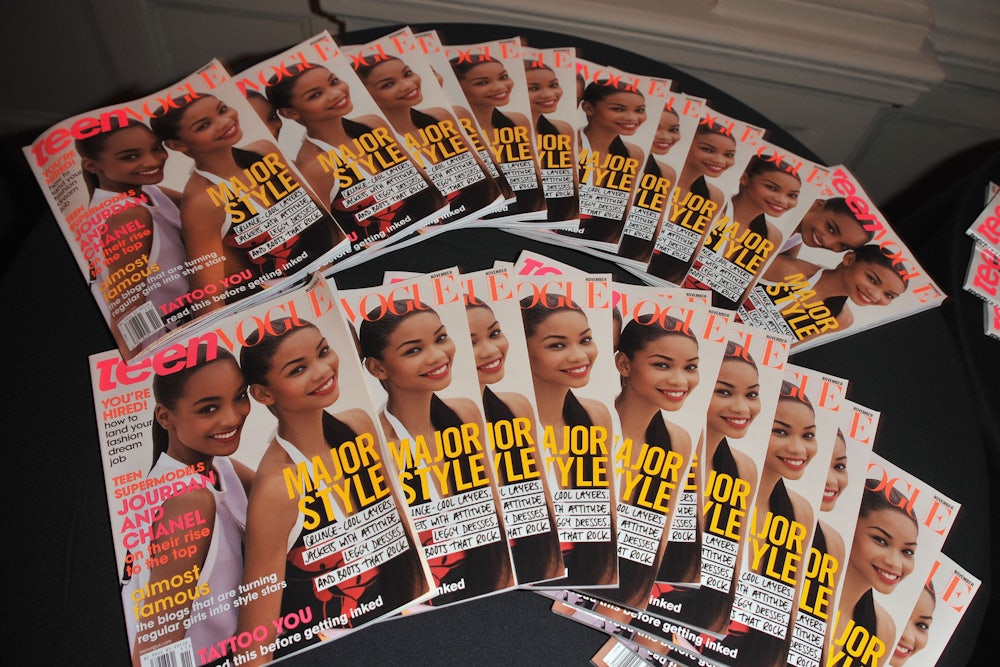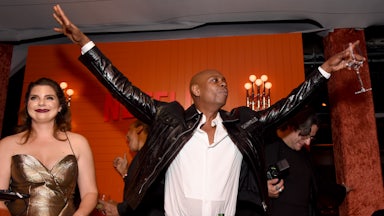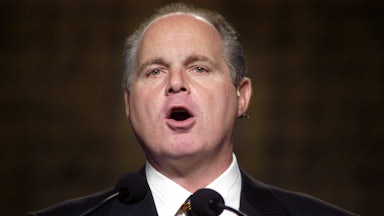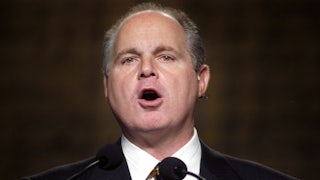The exit of an editor in chief at Teen Vogue isn’t the kind of thing that usually gets international media pickup, but the brief tenure of Alexi McCammond—whose hiring and resignation at the magazine took place within the span of a month—is an almost lab-perfect story for right-wing churn. Fox News declared, “Even Anna Wintour couldn’t save Alexi McCammond from cancel culture,” and the Daily Mail published paparazzi shots of the 27-year-old with a headline announcing she had been spotted outside “for the first time” since leaving the publication.
McCammond, the narrative goes, didn’t so much resign as she was forced out by the magazine’s young, progressive staff in response to a series of racist tweets mocking Asian people’s “swollen” eyes that she posted a decade ago, when she was just 17 years old. After readers resurfaced those tweets earlier this month, roughly 20 members of the magazine’s staff put out a statement condemning their content and promising an internal process to maintain the “integrity granted to us by our audience.” McCammond, who would have been the third Black editor in chief of the publication, apologized, both publicly and privately, to the staff and readers. (She had also apologized for the tweets when they were first discovered in 2019, calling them “insensitive.”) From there, the story went relatively quiet until McCammond announced her resignation on Thursday of last week, before her first official day on the job.
Almost immediately, the event was swallowed deeper into the swirling discourse around cancel culture. The contours of the argument went like this: It is ludicrous to punish someone for things they said as a teenager. “If Teen Vogue, even in its current woke incarnation, does not exist to celebrate this period of still-expungeable error, then it may as well be calling for the abolition of the teenage years altogether,” Graeme Wood wrote at The Atlantic. “Its staff, as well as many of its advertisers, evidently think its readers deserve no bonfire, no sin jubilee, and should be hounded eternally for their dumbest and most bigoted utterances.”
This narrative assumes a lot about an intentionally opaque internal process that, as far as I can tell, most of us know nothing about. It also omits potentially relevant details: McCammond had no past managerial experience and came to the magazine from a position relatively close to the Biden administration, which Teen Vogue covers quite critically. There is also the matter of squeamish advertisers and weeks of bad press that left Condé executives playing defense on a story that had escaped their control. But perhaps the simplest thing that no one was saying in this cycle of coverage was that workers do not get to choose their boss: Condé management hired McCammond, and Condé management ultimately determined the length of her tenure and conditions of her exit. Yet the idea that the staff had singularly forced her out soon cohered into the definitive story of what happened.
I don’t know the details any more than anyone else, but these strike me as familiar obfuscations of speech and power. The overwhelming narrative we got was one of management’s—that the power was fundamentally in the staff’s hands and that Condé’s executives and its H.R. department were helpless in the face of this newly activated woke mob. But aside from the initial note, the staff themselves have been mostly quiet. (There was also another note published from Teen Vogue’s official Twitter account stating the publication and McCammond could no longer “see a way forward together” and had decided on a mutual parting.)
It’s possible that in coming days we will hear more from the staff, either directly or through external reporting. But if we do, actually hearing the staff’s voices will be more unusual for a workplace than their absence. Workers, especially those without a union, have much less relative power to speak than their bosses. As The New York Times reported, Condé’s H.R. department held a meeting with Teen Vogue staff where “the publication’s employees were reminded of a company policy requiring them to check with the communications team before making public statements. The staff members were also told they should keep their criticisms ‘in the family,’ and they were left feeling they had little guidance on how to interact with their readers, one of the people said.” These workers are, like millions of others in this country, at-will employees. Their employment, like their speech, is not protected.
In other words, this is a labor dispute that has almost no labor analysis in the surrounding conversation. Closed systems like this conceal things. Workers—in this case, the staff of Teen Vogue and McCammond—are often conscripted into these secrets.
The story we then get usually fails to contend with power. It happens a lot. These dynamics get flattened into a tired story about the left—defined as whoever is considered to be its standard-bearer at a particular moment—as unforgiving or censorious or both, when I think the opposite is true. These are movements that care deeply about the expansion of speech and paths toward accountability and repair. Sam Adler-Bell wrote quite eloquently about this five years ago, in an essay responding to Jonathan Chait and similar discourses around so-called political correctness on college campuses:
When campus activists interrogate the abstract “free speech” rights of a commencement speaker—insisting that power dynamics always already condition who is permitted to speak with authority and whose speech is worthy of defense—Chait hears “we don’t care about free speech.” When, in fact, they do. Very much so. By applying the topography of power to a scenario that Chait imagines playing out on an even plane, the activists illuminate its actual political stakes: that perhaps the imperiled speech is not that of the wealthy person on stage with the microphone, but the students of color in the crowd trying to be heard.
And, as The New Republic’s Melissa Gira Grant wrote recently about a parallel speech debate around the “censorship” of anti-trans views:
If we were to understand freedom of speech more broadly, as a person’s capacity to express themselves, to have autonomy, to exist, then this debate becomes more complex and better resembles the world in which we live right now. Those are conversations worth having. We rarely do.
Similarly, when we don’t apply any topography of power to the situation at Teen Vogue—or swap in any publication that gets caught in a similar cycle of coverage—we’re left with a reductive takeaway: The woke left wants to get you fired for the stupid things you said as a teenager. (Fox News, rabid at stories like this, has now dug up a Teen Vogue staffer’s old tweets, under the headline: “Will ‘woke’ Teen Vogue staffers turn on social media manager over past ‘N-word’ tweets?”)
In this frame, there’s no room for larger questions about the conditions in which these matters of speech exist: Should staff have input in who their managers are before they’re hired? What does it mean to have a seat at the table to shape your publication’s ultimate direction? Are current ownership models in and of themselves inherently undemocratic? Are those pushing back against their bosses within those models constrained in their choices, and in what ways? While this is a fairly niche story about an elite industry, the dynamics are familiar: Within the companies they work at, workers have much less power relative to their bosses. For every story of one boss who got “canceled,” there are thousands more workers who are fired or laid off without any critical examination of their “speech” or “cancellation” from the likes of Fox News.
The danger is it’s the easy narratives—and they are so easy—that tend to catch fire. Cancel culture is quickly being made out to be the problem in society today, and it’s not by accident that the stories that get picked up and picked apart are those of campus activists or young staffers at a glossy magazine, who are easily painted as too privileged and too woke. And now the arguments have become so meaninglessly replicable that they’re echoed by the likes of Andrew Cuomo and Donald Trump—some of the most powerful, most protected politicians in the country—as a defense when they are being held to account.
It’s not that these things don’t matter, it’s just that the clumsy narratives decrying woke mobs miss the point: These are ultimately questions about who gets to speak and under what conditions. Condé set McCammond, and the magazine’s staff, up to fail. And yet they’ve seemingly evaded any responsibility for their decisions. It makes no sense.
We don’t live in a world where speech is equally guaranteed to everyone, but the cancel culture scolds aren’t the ones who are going to make that world possible. (Rarely do those same people rail about the imperiled speech of their perceived enemies, from Boycott, Divestment, and Sanctions movements on campuses to Black Lives Matter protesters.) As Adler-Bell wrote, “What leftists understand is that achieving that world—as opposed to the ‘actually existing’ liberal democracy we have today—will require a massive redistribution of income, wealth, and political power and sustained agitation against racism, sexism, and other forms of bigotry.”
None of these arguments are new, but I think they are worth reiterating—not to convince the writers who bemoan cancel culture on Twitter, but to combat the narrative that is taking hold more broadly that the left doesn’t care about free speech and wants to get you fired for your tweets. The vehicles through which these things are litigated—a Dr. Seuss book, a magazine’s editor in chief—are often petty and limited, allowing the right and center to dominate the conversation around speech and power. The mechanisms those of us on the left have to respond to them are more complicated, and inherently clumsy and imprecise, but we need to keep trying. The stakes are too high to keep getting it wrong.








